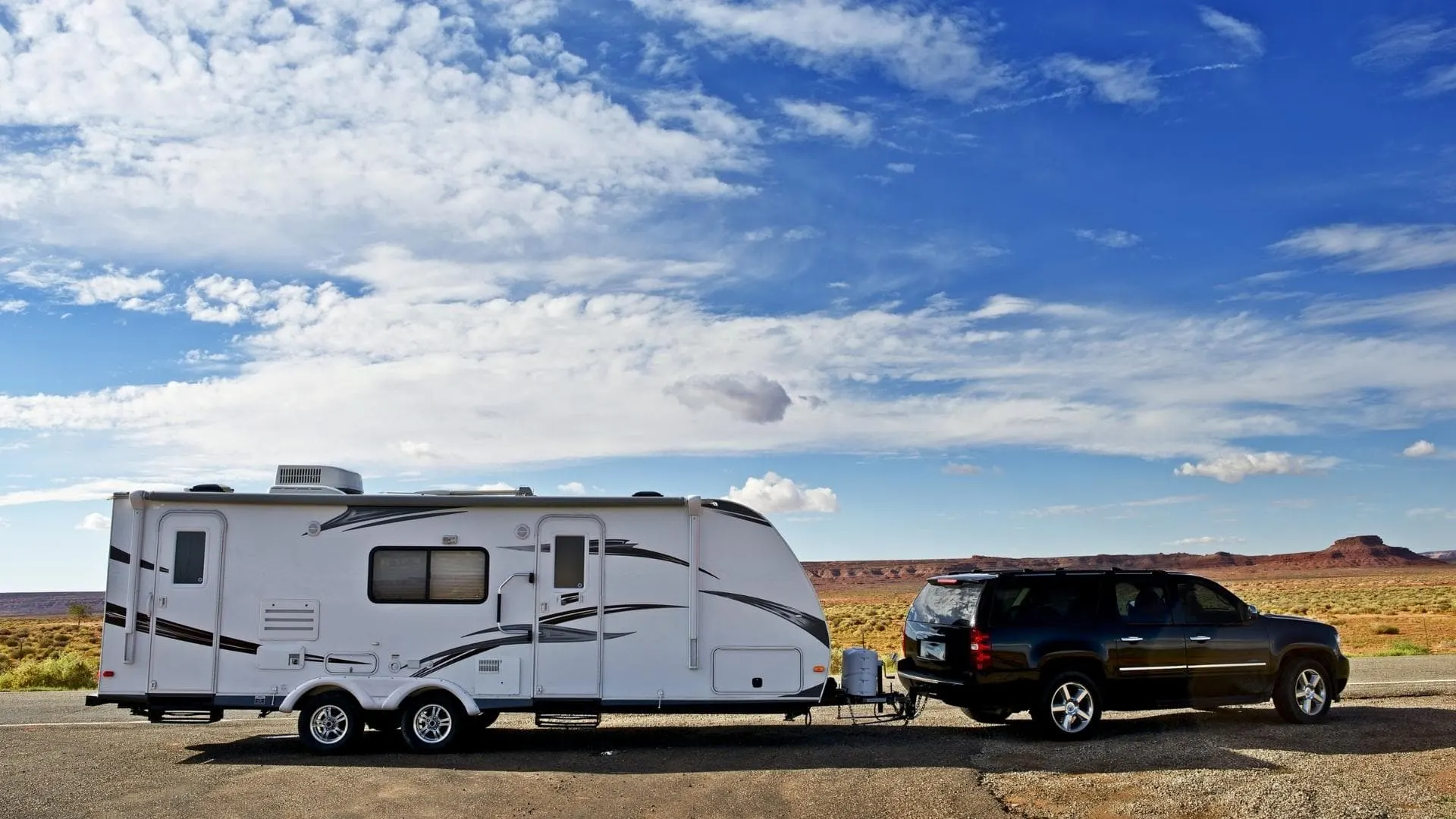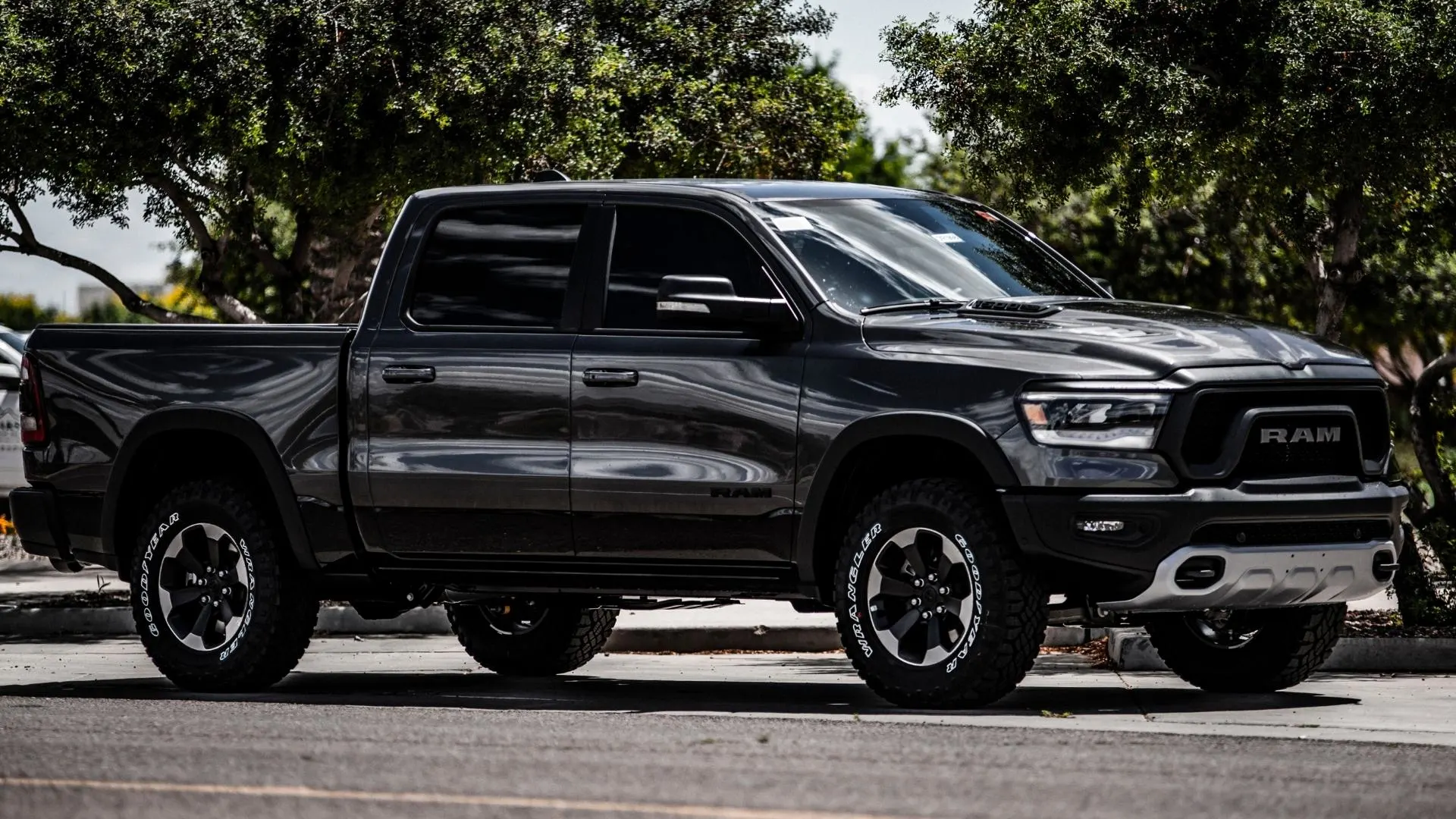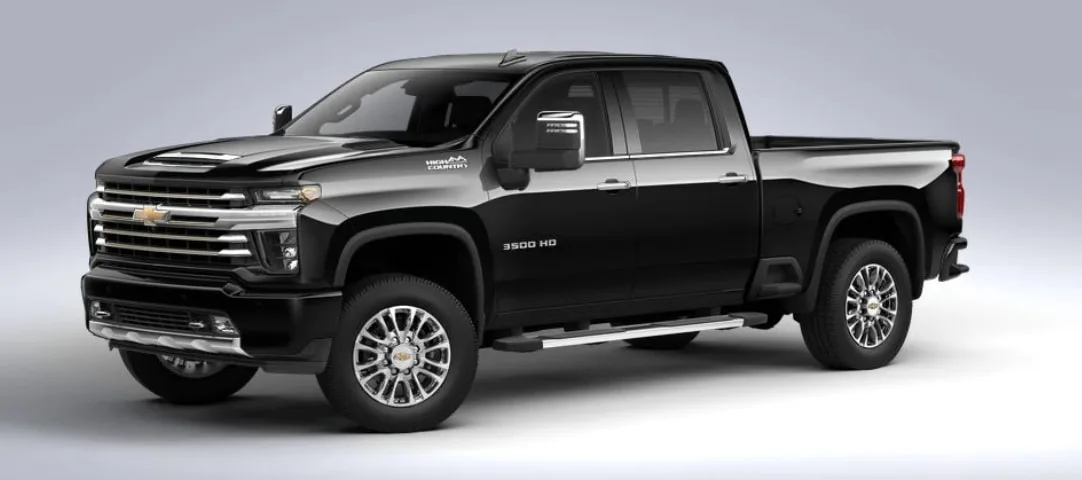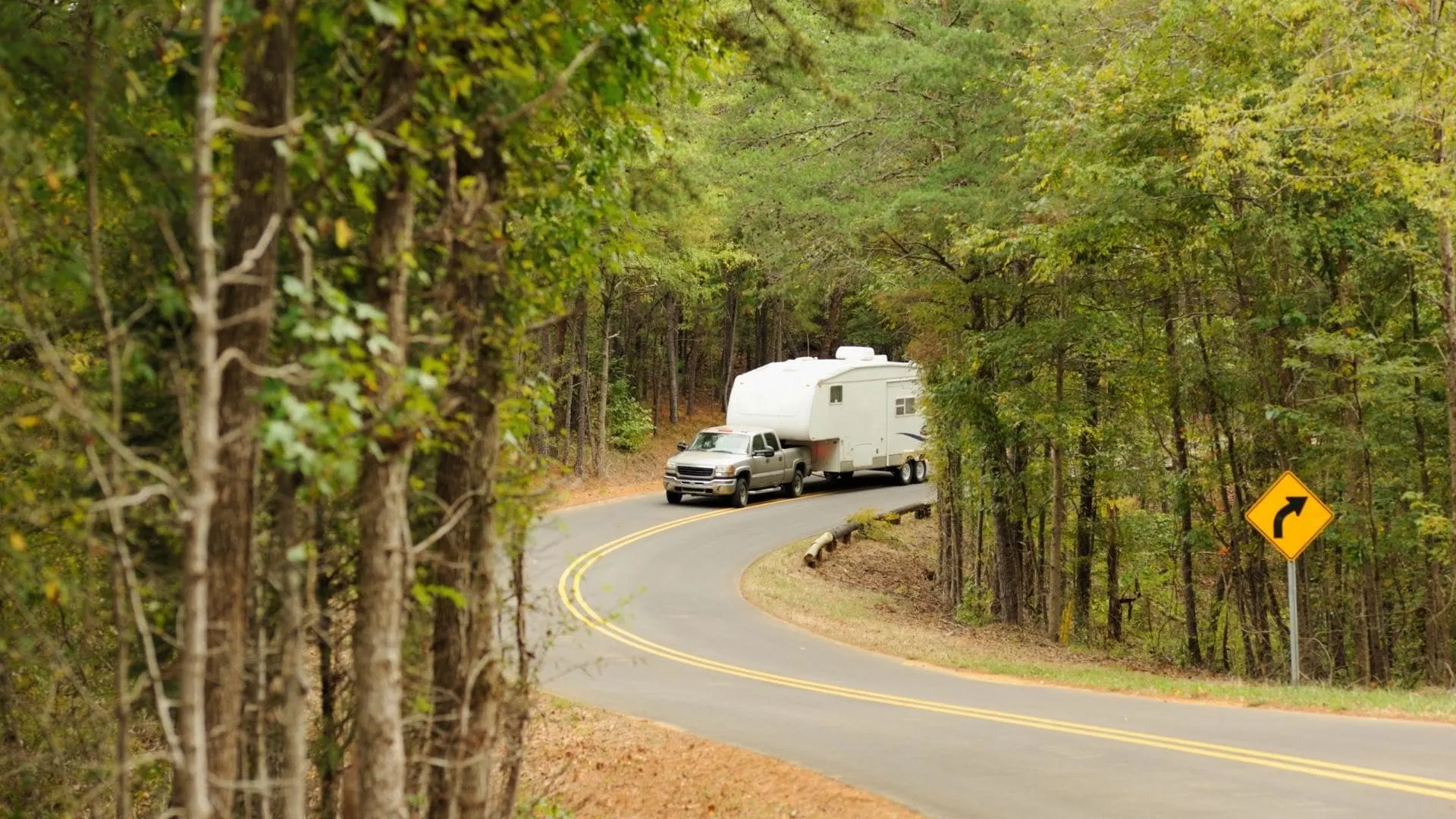If you’re the owner of a one-ton pickup truck, and you’re looking at buying a particular travel trailer, you may be wondering if your truck and that towable RV are a good match. And that’s a critical consideration. For all sorts of reasons, it’s imperative that a tow vehicle be capable of safely towing a camper (note the emphasis on the word “safely”). So, what is a one-ton truck and how much weight can it pull?
Because this is such an important question, we’re using this post to lay out the details.
- 1) What Is Payload Capacity?
- 2) Is a Pickup Truck’s Weight Class Equal to Its Payload?
- 3) What Is a “Light Duty” Truck?
- 4) What Is a “Heavy Duty” Truck?
- 5) What Is a One-Ton Truck?
- 6) What Is the Payload Capacity of a One-Ton Truck?
- 7) Can a One-Ton Pickup Truck Tow the Camper/Trailer I’m Interested In?
- 8) How Much Weight Can a One-Ton Pull?
- 9) Can a One-Ton Pull a 5th Wheel?
- 10) Can a One-Ton Pull a Toy Hauler?
- 11) What Truck Hauls Your Travel Trailer?
What Is Payload Capacity?
A key factor when considering any truck’s ability to haul anything is payload capacity. It’s not the only important factor, but it is a key piece of information.
Payload capacity refers to the maximum amount of weight the truck can safely carry.
It’s a common misconception that payload capacity is the amount of weight you can carry in your truck’s bed, but that’s not the case. Payload includes everything in the truck, including you and any other passengers, gear, water, oil, fuel, etc. If it’s in or on your truck, it counts as payload. And that’s not all…
If you’re pulling a camper, your payload includes the tongue weight, which is the downward force that the tongue of a trailer applies to the hitch of the vehicle towing it. If you’re not sure what your towable RV’s tongue weight is, consider picking up a trailer tongue weight scale like this one:
- 1 Year Manufacturers Warranty (certain items exempt)
- Made in the USA
That downward force the trailer tongue exerts on the hitch ball (tongue weight) is also very important to safe towing, so we encourage you to check out our post “What Is Tongue Weight and Why Is It Important?” for further details.

If you’re pulling a camper, your payload includes the tongue weight, which is the downward force that the tongue of a trailer applies to the hitch of the tow vehicle.
It’s worth repeating before we move on that payload capacity is the maximum amount of weight your truck can safely carry. But you’ve got to be sure to include everything (and everyone) in and on the truck, as well as your tongue weight if you’re planning on towing anything with that truck.
A simple way to look at payload is that it should include the weight of the truck plus anything and everything that wasn’t included with the truck when it left the factory.
Bear in mind that your truck’s chassis, body, axles, and suspension are built to withstand a particular weight and no more. When you exceed your truck’s payload capacity, not only is that illegal, but you risk damaging your truck and, worse yet, losing control of it and causing an accident.
There are a few ways to determine a truck’s payload. You can look at the official data provided by the truck’s manufacturer (either in your owner’s manual or on the manufacturer’s website). Be sure to look for the data for your truck’s specific make, model, and year.
You can also calculate payload by finding the GVWR (Gross Vehicle Weight Rating) of your truck as well as the truck’s curb weight.
GVWR – curb weight = payload capacity if you’re not towing anything.
If you’re towing a camper, then you’ll make your payload calculation accordingly:
GVWR – curb weight – tongue weight = payload capacity when towing.
Gross Vehicle Weight Rating (GVWR) is defined as the maximum allowed weight of the vehicle, including passengers, cargo, fluids, etc.
“Curb” weight is the weight of the vehicle itself including a full tank of fuel and all standard equipment. Curb weight doesn’t include the weight of any passengers, cargo, or optional equipment.
When it comes to towing vs payload, you’ll need to know your truck’s GCWR (Gross COMBINED Weight Rating), which we’ll get into below.
Is a Pickup Truck’s Weight Class Equal to Its Payload?
No. At one time these were the general guidelines – a half-ton pickup could carry up to 1,000 pounds (half of the 2,000 pounds in a ton), a three-quarter-ton pickup could carry up to 1,500-lbs, and a one-ton pickup could carry up to 2,000-lbs. But this is no longer the case.
These days, modern trucks can far exceed these original guidelines, so they no longer apply as they once did. For example, most of today’s half-ton pickups have a payload capacity closer to 2,000 pounds.
What Is a “Light Duty” Truck?
A “light duty” truck – also sometimes referred to as a “full size” truck – is the most common classification of pickup truck.

The Ram 1500 is an example of a ‘light duty” truck.
A light-duty truck is also known as a half-ton truck, and you’ll sometimes see “150” or “1500” used in the model names of these trucks. Some examples of “light duty” or “half-ton” trucks are:
- Toyota Tundra
- Ford F-150
- Chevrolet Silverado 1500
- Ram 1500
- Nissan Titan
What Is a “Heavy Duty” Truck?

The Nissan Titan XD is an example of a”heavy-duty” or three-quarter-ton truck. (Photo credit: Nissan USA)
A “heavy-duty” truck is a three-quarter-ton truck. You’ll often see these trucks using “250” or “2500” in their model names. Some popular examples of heavy-duty or three-quarter-ton trucks are:
- Chevrolet Silverado 2500
- Ford F-250 Super Duty
- GMC Sierra 2500
- Ram 2500
- Nissan Titan XD
What Is a One-Ton Truck?
One-ton trucks are also referred to as “heavy-duty”, but their towing and hauling capacities are greater. Consumers overwhelmingly target the one-ton truck for towing, especially for larger RVs.

The Chevrolet Silverado 3500 HD is an example of a one-ton truck. (Photo credit: Chevrolet)
Some one-ton trucks include larger engines, trailer brakes, and dual rear wheels (thus the term “dually”). This allows the one-ton truck to tow & carry a significant amount of weight.
There are one-ton trucks that can tow more than 35,000 pounds, which is why these trucks sometimes use the term “350” or “3500” in their model names. Some examples of popular one-ton trucks are:
- Chevrolet Silverado 3500 HD
- Ram 3500
- GMC Sierra 3500
- Ford F-350
What Is the Payload Capacity of a One-Ton Truck?
As mentioned above, the payload capacity of a pickup truck, including a one-ton truck, can be calculated as follows:
GVWR – curb weight = payload capacity if you’re not towing
-OR-
GVWR – curb weight – tongue weight = payload capacity when towing
If you already have a particular camper in mind, and you know its tongue weight, then you could use that information to calculate your truck’s remaining payload capacity. But there are two other important factors that dictate whether you can tow a particular trailer: Towing Capacity and GCWR.
Can a One-Ton Pickup Truck Tow the Camper/Trailer I’m Interested In?
Besides the weight ratings already mentioned, you’ll need to know two more.
Towing Capacity is the maximum weight that a pickup truck can tow. If a fully-loaded travel trailer weighs 10,000 lbs, the truck towing it will need to have at least a 10,000 lb. towing capacity to handle it (though it’s generally recommended to use a truck that has a decent percentage more towing capacity for a good safety margin).
You’ll also need the truck’s GCWR (Gross COMBINED Weight Rating), which is the total maximum weight of the loaded truck plus the total weight of the loaded camper being towed. (Don’t forget the weight of all passengers!) This is the weight of everything!
When getting corner/position weights for the purpose of determining proper tire pressures (which we’ll be talking about more in an upcoming post) ordinary truck scales (the kind you normally see at truckstops) can’t do the job.

It’s important to know all of the accurate weight ratings of your truck when towing and when not towing your camper.
But for the purpose of determining your gross combined vehicle weight, truck stop scales will work just fine. If you already have a pickup truck and travel trailer, make sure that everything you normally carry is on board both vehicles. That includes gear, bikes, clothing, food, and people, as well as the typical levels of freshwater, fuel, and propane that you normally have when traveling.
Simply pull your entire fully-loaded combined rig onto the scales. That single weight reading should not only NOT exceed your truck’s GCWR, but it should be far enough below it to provide an additional margin of safety (typically a 10% margin is recommended, so you don’t want to exceed 90% of your truck’s listed GCWR).
If you want to know if a particular one-ton truck can tow a particular travel trailer, you can add the GVWR for the truck itself to the GVWR of the trailer. If those two numbers combined are below the truck’s Gross COMBINED Weight Rating (GCWR), that truck can tow that trailer, even when both are fully loaded to the max.
If the combined GVWRs for the two fully-loaded vehicles exceed the truck’s GCWR by a little bit, you may still be able to tow that trailer… just not fully loaded. Just be sure to stay below weight limits by a reasonable safety margin (and keep in mind that having this situation means that you could inadvertently exceed the GCWR for your truck, since you have the capacity to carry more in the trailer than your truck can safely tow).
How Much Weight Can a One-Ton Pull?
Depending on the powertrain, some one-ton trucks can tow up to 36,000 pounds! Usually, a diesel powertrain will allow the truck to tow on the higher end of this range. Check the specs on any truck you’re considering. And of course, check the specs on any travel trailer you’re considering towing with that truck.
Can a One-Ton Pull a 5th Wheel?
A one-ton truck may well be able to pull a 5th wheel, but the answer to this question is more complicated than a simple generalization will allow.
The real answer is “it depends”. It’s really all about PAYLOAD. So, whether or not a one-ton truck can pull a 5th wheel depends on the specific 5th wheel AND everything the truck is carrying, (including passengers).
There are a couple of key factors to keep in mind.

A one-ton truck is often capable of pulling a 5th wheel, but specifics are critical. You never want to exceed the weight ratings and specifications of your truck.
First of all, there are some very heavy 5th wheels out there. Some are huge and have full-sized refrigerators, washing machines and dryers, dishwashers, numerous beds and other furniture, and very large holding tanks. (Keep in mind that if you have a 100-gallon fresh water tank and it’s full, you’re carrying an additional 830 pounds.) All of these things can add up quickly. And some of that weight is being distributed to the truck through the fifth-wheel/kingpin connection.
So – the answer to the question, “Can a one-ton truck pull a 5th wheel” depends on the weight of the 5th wheel and everything you’re carrying in and on your truck.
A one-ton truck is often capable of pulling a 5th wheel, but specifics are critical. You never want to exceed the weight ratings and specifications of your truck.
It’s crucial that you NEVER max out your truck’s payload capacity or towing capacity.
Again, not only can you damage your truck, but you’re risking your safety… and the safety of others sharing the road with you.
Can a One-Ton Pull a Toy Hauler?
The same answer applies to a toy hauler as it did to a 5th wheel. A one-ton truck is often perfectly sufficient to tow a toy hauler. BUT – specifics are critical, so we can’t make blanket generalizations. Some toy haulers (and what they’re hauling) may require a larger truck than a one-ton.
In short, a one-ton truck may well be able to pull a toy hauler, depending on the toy hauler and its contents plus everything being carried by the truck. It’s all about payload, payload, payload.
See our past posts for some great information regarding what is meant by dry weight on a camper and very important methods for trailer sway control.
What Truck Hauls Your Travel Trailer?
So, tell us – what are you using to haul your travel trailer? And tell us about the camper! We’d love to hear what you’ve found to be a safe and successful combination for pulling your camper to your favorite camping spots. Leave us a comment below!
Geek Out With Us Every Week
Join our newsletter to learn about all things RV-related. Every week we offer free tips, tricks, product reviews, and more to our online community of RVers. So, whether this is your first time on the road or you’re a seasoned expert, we’d love for you to geek out with us!



Dave G
Wednesday 27th of March 2024
We have a Grand Design 320G and I just ordered a new single rear axle F-350 truck. I'm debating wether I should change the order to a dually. Anyone pulling this with a single rear axle and is it a comfortable ride?
TheRVgeeks
Wednesday 27th of March 2024
Hi Dave. Can't say whether or not that combination is going to be good, but you might want to checkout out these two videos from our friends Chris & Aaron over at Irene Iron Travels... might be helpful for you:
Ford Super Duty F350 (single-axle) OVERWEIGHT update! (what we did to fix it) Why a RAM 3500 Mega Cab Short Bed Dually for Towing our 5th Wheel RV (and 2 problems)Howard Thornton
Wednesday 27th of March 2024
We have a Grand Design Imagine XLS 17MKE and pull it with a 2019 Ford F150. The rig pulls nicely using a weight distribution sway control. We recently had it weighed at a SmartWeigh station which was invaluable. We learned that our rig was nearly perfectly balanced as is and a couple of “tweaks” made it spot on.
I highly recommend getting your rig weighed at a SmartWeigh location.
Armor Todd
Wednesday 27th of March 2024
We tow our 2021 Winnebago Micro Minnie 2108TB with a Chevy Silverado 1500 5.3L with tow package. Trailer wet weighs 5000lbs. Tongue weight about 500lbs. Truck towing capcity 9700 lbs: payload 1950 lbs. Works perfectly.
Glenn
Wednesday 27th of March 2024
I have a 2022 Forest River, Salem Hemisphere 270FKS.
Tow it with a 2022 Ford F-350 crewcab, shortbed. 6.2 gas motor, snow plow and camper packages, 3.73:1 axles, and ultimate trailer tow package. Truck does very well. Only drops about 3/4 inch when hooking up.
Greg and Heather
Sunday 27th of March 2022
We have a 32' heartland sundance 5th wheel our truck is a 2021 f-250 we ordered the camper and plow package and the 6.2 gas engine it works very well we also double tow a small aluminum fishing boat behind. Camp in Northern Ontario and Quebec .
TheRVgeeks
Sunday 27th of March 2022
Hi Greg and Heather! Sounds like an awesome setup! Always great to hear from fellow Canucks.????????